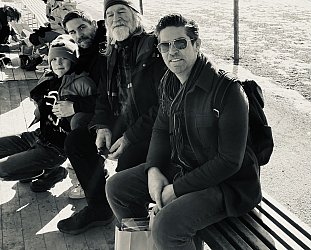Graham Reid | | 10 min read

In the final weeks of the siege, battle-weary troops defending the capital were forced back through the inner suburbs by tanks and artillery. They fought out of fear of capture, and some from loyalty to a failed ideology. They were outnumbered and outgunned.
By day their city had been bombed into submission by American planes taking advantage of their unchallenged freedom of the skies. At night, fires in the gap-tooth buildings gave the city the appearance of a hellish vision from Brueghel.
Snipers and teenage boys press-ganged into service at the point of a gun retreated street by street and building by building. Civilians fled, the end was inevitable.
Their once powerful leader, an icon as much feared as loved, had been seen so seldom recently some said he was dead. Senior generals who previously ordered immediate execution for anyone failing to fight to the bloody end brought civilian clothes into their bunker in preparation for their escape.
Everywhere the air was penetrated by bombs, bullets and screaming. As one observer put it: "I had a terrible mass of impressions. Fires and smoke, smoke, smoke. Huge crowds of prisoners of war. Faces are full of tragedy and the grief on many faces is not only personal suffering but also that of a citizen of a destroyed country."
This is not Baghdad of the past week. These familiar images rise from the charnel house of history. This is Berlin in May 1945 as the invading Russian troops moved in from the east, racing the British and American Armies coming from the west, to capture Hitler's Reichstag and whatever booty - especially atomic equipment and scientists in the uranium-stocked Kaiser Wilhelm Institute - might be left.
The fall of Berlin to the invading horde of often undisciplined, vengeful Russians is evocatively recounted in unremitting detail by British military historian Antony Beevor in his mammoth and timely Berlin, The Downfall 1945.
In prose which shifts cinematically from bloody battlegrounds to backroom strategists, from Stalin's cabal to Hitler's claustrophobic bunker, Beevor details the death rattle of the fascist Third Reich in the face of the advancing communists.
In hindsight this was a conflict of ideologies -- but it was also young men and women killing each other in their thousands with brutal and indiscriminate efficiency.
Beevor brings to bear the eye of a novelist to scan the landscape and focus on telling details in the carnage: the flesh crudely hacked off dead horses and cows by the roadside to provide food for the straggling, hungry Russian troops; a young and popular German lieutenant with "pink cheeks, clear complexion and large clear eyes", according to a comrade, buried under rubble when a Soviet shell demolishes the wall he is sheltering beside.
Such detail humanises the faceless barbarism, yet as the body count of victims and refugees rises in Beevor's blood-drenched pages -- the survivors must be counted alongside the dead as victims -- historic events appear as mere paragraphs in this catalogue of misery: German refugees packed on board the ship Wilhelm Gustloff near Danzig. That night it was torpedoed by a Russian submarine and between 5300 and 7400 lost their lives. It was the greatest maritime disaster in history.
Bare statistics give cause for pause: between January 12 and mid-February 1945 almost 8.5 million Germans fled their homes in the eastern provinces of Hitler's Reich.
The battle for Baghdad this week has been a minor skirmish in comparison and Beevor says the scale of human tragedy at the end of World War 11 is beyond the imagination of everyone who did not live through it.
"Okay, we are getting a lot of military stuff on the box now," says this crisply spoken, 56-year-old historian, "but only a tiny minority has any idea of what military service involves, and what life is like in an army, in comparison with their fathers' and grandfathers' generations where there was conscription and military service.
"[The young] are fascinated by a period where individuals had no control over their own fate and were caught up in an appalling maelstrom. And they wonder whether they would have survived and whether they would have had to courage to refuse to shoot prisoners if ordered to."
Beevor's Berlin has garnered almost universal praise, as did his earlier account of the defence of Stalingrad, both books described by Boyd Tonkins in the Independent last year as possessing "an atrocious majesty".
As an articulate military historian who spent time in the services -- he was educated at Sandhurst and had three years as a lieutenant in the 11th Hussars in the late 60s, at one point eyeballing Soviet tanks when they rolled into Dubcek's Czechoslovakia -- he is in demand as media commentator about Iraq, a role he is reluctant to undertake because of media misperceptions.
"At least, thank God, people have finally woken up to the fact that Baghdad is not going to be Stalingrad. They talk about 'Saddamgrad' -- it's been ridiculous. The trouble with the press, at least in this country, is having to make immediate links with something people recognise -- and Baghdad and Stalingrad both end with 'dad'.
"If anything, it's going to be much closer to Berlin, purely because Saddam -- despite the irony his great hero is Stalin -- is actually much more likely to finish off like Hitler in a bunker somewhere."
As a historian he believes his first duty is to tell the truth of the horrors of war as he finds them and not lecture or make moral judgments ("They should be made by the reader"). But he is also aware the military doesn't tell the truth of war to its own. "I think there were major faults on intelligence assessment before the war began ... the leaders of the coalition completely underestimated the effect of '91 on the Iraqis and they felt let down and, not surprisingly, betrayed, and being told to rise up and receive no support whatsoever. That was outrageous."
He speculates on the future of Iraq after the invasion is complete: "No country loves their liberator, I'm afraid."
As one who has written about the liberation of Paris and the effects which linger to this day, he says there is an underlying sense of humiliation.
"There are exceptions of course, but in France, where the humiliation of 1940 had gone so deep, the notion that the British and the Americans -- both countries to which they had fairly ambivalent feeling already, to say the least -- had been their liberators stuck in French throats in a big way."
There is no love lost between many Iraqis and the Americans they feel betrayed them in the last Gulf War, so the taste of liberation may be sour on all sides. And each will write their own version of events.
Beevor's Berlin, an even-handed account of the final months of the Russian advance, catalogues atrocities by the invaders and has met an angry response in Russia.
Previously unavailable papers and interviews confirm the rampage toward Hitler's bunker was an orgy of calculated destruction. One respected Russian commander -- Beevor describes him as perhaps the most intelligent and cultivated of them all -- when told his troops were embarking on an orgy of destruction said, "It is now time for our soldiers to issue their own justice".
For many from the sexually repressed Soviet society that meant rape. Beevor estimates up to two million women -- mostly German but sometimes captured Poles, Ukrainians and even Russians this army was there to liberate -- were systematically raped, often many times, by soldiers whose superiors ignored the barbarity or found euphemisms -- "negative phenomena" for gang rape -- to sanitise it.
Despite documented evidence, Beevor's book has been denounced in the Russian media, the ambassador to London last year calling it "a clear case of slander against the people who saved the world from Nazism".
But Beevor -- who had previously published accounts of the Spanish Civil War and the battle for Crete -- is a scrupulous historian whose earlier Stalingrad won favour with the Russians for its accuracy. It picked up numerous literary and historical awards, sold more than half a million copies and has been reprinted in more than 20 languages since publication in 98.
It was his research for Stalingrad which led to the writing of Berlin, a natural historic corollary. He recalls reading how an elderly Russian officer took German prisoners of war at Stalingrad outside, pointed at the city's ruins and said, "This is what Berlin is going to look like".
"From that moment Berlin had to follow Stalingrad -- the two cities were so closely linked in the Russian and German minds."
In Germany survivors of the Russian advance have now been able to see themselves as victims as much as those who suffered under the jackboot of Nazism. Berlin arrived at the same time as Gunter Grass' novel Crabwalk, a novelisation of the sinking of the Wilhelm Gustloff, and Jorg Friedrich's Der Brand (The Burning) about the destruction of cities in Germany by the RAF and USAF.
"This has created a tremendous reaction that, 'We are victims too, like other victims of Nazism'. That's fine and quite right because there's no way that the present generations should bear guilt for the war at all.
"The danger is if it is taken so far, particularly by the extreme right, so Germans see themselves as victims and forget about the victims of the Germans."
Beevor observes the present tensions with Germans whose families were expelled from Czechoslovakia at the end of the war now wanting their land back.
"Plus of course Poland. Already now you have Germans going back and buying up the land which their families used to own and they are living there, sometimes in the old family schloss, amidst hostile Poles.
"It actually makes you think of illegal Jewish settlements on the West Bank. It's a slightly worrying thing and I mustn't overdramatise it, but it is raising a number of anxieties and worries among the Polish population."
With contemporary analogies like that and the historian's long view of world events, it is not surprising he has become a media commentator. His writing style has brought humanity back to a genre which was for too long the provenance of retired generals who saw military events as well-ordered chess games.
He has no doubt that the Americans helming the operations in Iraq have studied Stalingrad and Berlin -- "and probably Grozny too", as examples of what not to do in street fighting. This explains why there are, comparatively, so few casualties in the present conflict.
Beevor not only watches the ground war in Iraq but also sees the greater historical sweep.
As with the Russians in Germany, this army will leave the land it is now occupying and once the straitjacket of dictatorship has been stripped away factionalism will rise. The potential for civil war in Iraq has been much underestimated, and when observed through the telescope of time we might see the patterns of the past replicating themselves.
In his final days Hitler, proclaiming impending victory as bombs shook the ground above his head, sounded like a less lucid version of one of Hussein's loyalists-in-denial this past week.
In wartime, especially when the regime is falling, delusion becomes reality.
The names change, the details of the events differ, but the wheel turns full circle and, given time, the victims from this charnel house of history may too be given voice.
This article appeared in the New Zealand Herald, April 12 2003 when the American invasion of Iraq was in the headlines. There is a complete transcript of the interview at www.nzherald.co.nz







post a comment